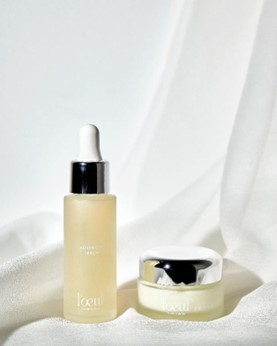IntegriCulture's skincare ingredient utilizing cellular agriculture technology "CELLAMENT" adopted in a new product of BASEPLUS
- The successful launch of a new skincare brand with the world's first egg-derived cell culture supernatant 1 -
Tokyo, Japan, June 1, 2022 — IntegriCulture Inc. (hereafter IntegriCulture), a Japanese cellular agriculture startup pioneering revolutionary advancements in cellular agriculture and aims for a sustainable world, today announced that “CELLAMENT™”2, an egg-derived skincare ingredient utilizing its proprietary cell culture technology, has been adopted in new skincare brand l'oeuf by essensebase launched today by BASEPLUS Co., Ltd. This is the second skincare brands that CELLAMENT has been selected and formulated as a main active ingredient which even inspired the brand names3 since its launch in April 2021.
Yuki Hanyu, CEO at IntegriCulture said: “Cellular agriculture is often spoken in the food context, but what must not be forgotten is that opportunities of cellular agriculture go beyond food. Examples include solid materials like leather, fur and fluid substances like cosmetics and pharmaceuticals. As a leading cellular agriculture company, we would like to demonstrate such possibility with BASEPLUS’s ‘l'oeuf advanced serum’ and ‘l'oeuf enrich cream.’”
Products Information by BASEPLUS Co., Ltd.

Brand: l'oeuf by essencebase
Product: l'oeuf advanced serum | booster serum (left)
Content: 30mL
Price: 8,800 yen (tax included)
- Contains 3% CELLAMENT
- Ultra anti-aging effect and skin barrier function
- Packed with 8 plants extracts
- Formulated without parabens, petroleum-based surfactant, silicon, ethanol, mineral oil, artificial dyes or synthetic fragrances
- Cleared patch test for sensitive skin
Product: l'oeuf enrich cream | moisturizing cream (right)
Content: 30g
Price: 7,480 yen (tax included)
- Contains 1% CELLAMENT
- Highly moisturizing with non-greasy and smooth formula for firm and toned skin
- Formulated without petroleum-based surfactant, ethanol, mineral oil, artificial dyes or synthetic fragrances
For more information, please visit https://www.essencebase.jp/
About “CELLAMENT”
IntegriCulture has developed the CulNet™ system, which produces growth factors and serum components that account for a large part of the cost of producing cultivated meat. The culture supernatant obtained from this system includes various useful components necessary for culturing target cells (e.g., muscle cells and liver cells).
Since it was confirmed that the culture supernatant of chicken egg embryo extraembryonic membrane conditioned cells obtained at the development stage of this CulNet system is also useful for human skin4, we have considered the stability as a cosmetic raw material. It was launched our original cosmetic ingredient "CELLAMENT™," which designed to repair and rejuvenate the skin in April 2021. For more information, visit https://www.cellament.jp/cellament-en.
Notes to editors:
1 World's first: As a cosmetic containing "Chicken egg embryo extraembryonic cell conditioned culture solution" newly registered in INCI (International Nomenclature of Cosmetic Ingredients)
2 CELLAMENT™: [Skin conditioning component] Egg embryo extraembryonic cell conditioned culture medium, BG, pentylene glycol. Egg-derived cell culture supernatant, which was born from IntegriCulture's unique cell culture technology. Released April 7, 2021 https://integriculture.com/en/news/625/
3 L'oeuf means egg in French.
CONC CELLAMENT ESSENCE by Euglena Co.,, Ltd., https://online.euglena.jp/shop/pages/conc.aspx
4 Research results: Fragrance Journal "FRAGRANCE JOURNAL" June 2020 issue P74-P79
About IntegriCulture Inc.
We aim to use our proprietary cost-competitive cell culture technology "CulNet™ system" as a new platform in the biotechnology field, and to use it in various fields such as foods and leather made up of animal cells. The CulNet system is a versatile cell culture platform technology that simulates the interaction between organs in animals (patented). This technology can cultivate all animal cells on a large scale and at low cost and is expected to be used for various purposes including cultivated meat. At the lab scale, we have already achieved the production of serum components, which contributed to the high cost. By realizing in-house production of serum components, it is not necessary to use fetal bovine serum and growth factors, which are the main causes of high cost of conventional cell culture, and the cost of cell culture can be significantly reduced. For more information, visit https://integriculture.com/en/.
Media Contact
IntegriCulture PR team: pr@integriculture.com
